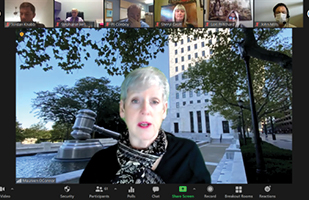Supreme Court Welcomes New Magistrates Virtually

Chief Justice Maureen O’Connor welcomes 59 new magistrates during a recent orientation.

Chief Justice Maureen O’Connor welcomes 59 new magistrates during a recent orientation.
Transitioning from the bar to the bench hasn’t been easy for Jennifer Marietta, a new magistrate at the Greene County Juvenile Court.
“I’m used to being on one side and having to fight really hard for my clients’ interests,” she said, of her days practicing as an attorney.She recently took part in a three-day new magistrate orientation – organized by the Court’s Judicial College – to help attendees evaluate and improve their knowledge and skills as judicial officers.
“I am the youngest magistrate at my job and it was refreshing to hear from the more senior attorneys and magistrates who want to be mentors,” said Khalilah Lawson, a magistrate at the Cuyahoga County Probate Court.
“I enjoyed all the courses this week, but the ones that resonated the most were the ‘Procedural Fairness and Implicit Bias Course’ and the ‘Effective Communication Course,’ ” Lawson said.
“I respect that the moderators were able to acknowledge that bias exists in the legal system and many times we bring our personal biases to the courtroom. But it was also reinforced that it is our job as magistrates to break these barriers daily.”
Kira Sandra Krivosh, a new magistrate at the Cuyahoga County Juvenile Division, called the courses “exceptional.”
“There is so much information to consider as a new magistrate, she said. “The Court has made it easy to manage and follow. They have provided us numerous resources and contacts in order to make sure we begin our journey with the best skillset and contacts.”
“I have really enjoyed meeting new colleagues and perspective through the interactive zooms,” she said.
Chief Justice Maureen O’Connor appeared live through remote technology to welcome the new magistrates and offer encouragement.
“If this pandemic has taught me anything, it is that remote technology has become the new way of working,” she said. “We have been changed forever. Society’s adoption of remote technologies will only grow and improve.”
Unlike judges, magistrates are not elected. Instead, they’re appointed by a judge and operate under the supervision of that elected judge.
Magistrates handle most types of cases in a specific court where cases are reviewed by the supervising judge.


